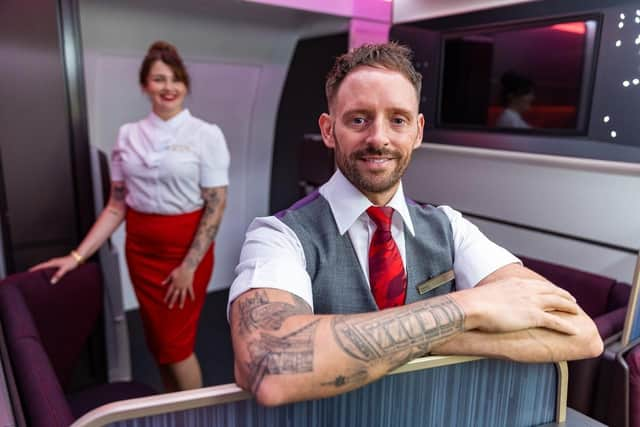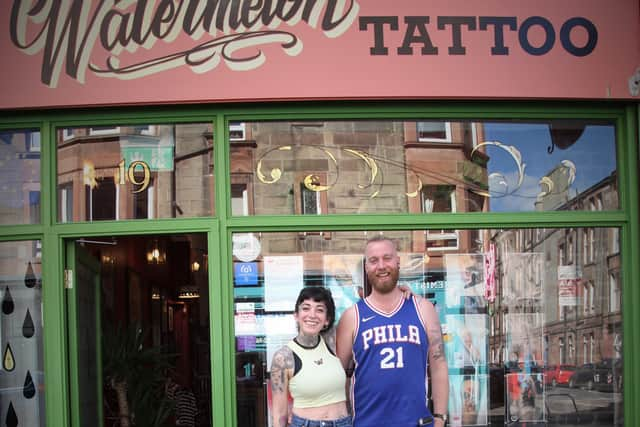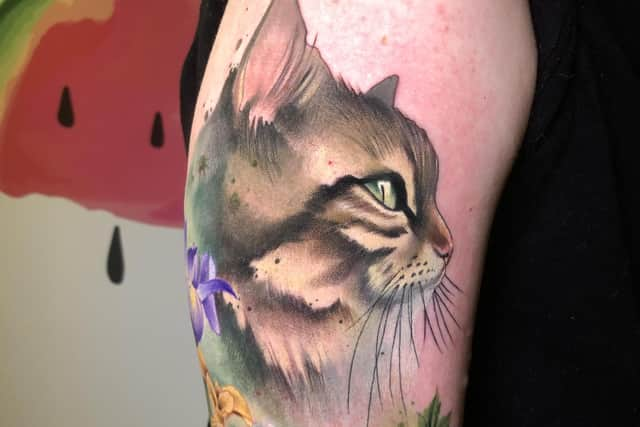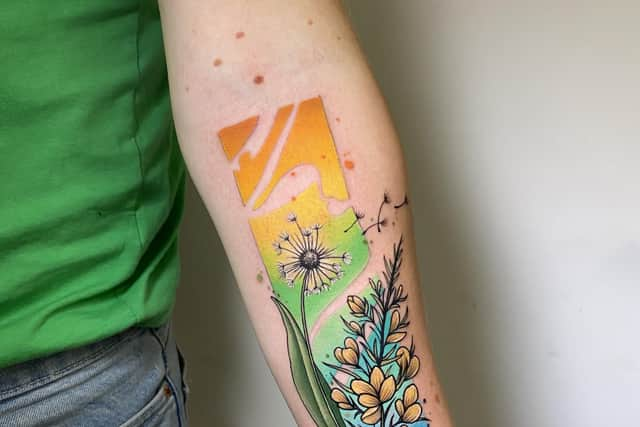Virgin are allowing cabin crew to display their tattoos: has ink gone totally mainstream?


On May 31, International Flight Attendant Day, Virgin Atlantic announced that it’d be allowing its cabin crew to display their tattoos.
Previously, they’d have to be covered with a long-sleeved shirt, plasters or make-up.
Advertisement
Hide AdAdvertisement
Hide Ad“Many people use tattoos to express their unique identities and our customer-facing and uniformed colleagues should not be excluded from doing so if they choose,” says Estelle Hollingsworth, chief people officer at Virgin Atlantic. “That's why, in line with our focus on inclusion and championing individuality, we're relaxing our tattoo restrictions for all our people. We're proud to be the airline that sees the world differently and allows our people to truly be themselves.”


It seems we’ve come a long way since tattoos were counter-cultural and the sure sign of a rebel or outsider. If cabin crew can show off their ink, then maybe it’s not too long until we'll see politicians displaying their tats? Or, perhaps the increasingly mainstream endorsement will erase every last trace of coolness and edginess?
We spoke to Watermelon Tattoo’s Sandie Tweedie, 37, about his job and what this move means in the world of body art.
Along with his wife, Noemi Sorrentino, he’s owned his shop on Edinburgh’s Easter Road for four years. Sorrentino, who specialises in watercolour tattoos, is a permanent tattooist there, along with blackwork artist, Liz Minelli. They also have a guest on rotation. This couple have never been busier, and think demand is only going to increase. “We’re still waiting for peak tattoo,” says Tweedie.


Are tattoos still rebellious?
Over the years, taboos have certainly lifted around tattoos - they’re no longer associated with criminals and sailors. Noemi’s got about 12 years of experience in tattooing, and she’s seen a paradigm shift in people's attitudes. It's changed from a subculture to more of a pop culture.
Any jobs where a tattoo is ill advised?
A few years ago, they started to allow policemen to get tattoos and they are a lot more visible in the workforce. There are some places that will frown upon it. For example, professions like doctors and social workers and if you’re going to numerous meetings with people. A lot of places have started to make their own policies about tattoos in the workplace. However, if people want a discreet tattoo, in an area like a bra line, or on a foot, we find that it’s generally to hide it from family members or for religious reasons, rather than a workplace policy.


Are tattoos ever an advantage when looking for work?
I think in some bars, it can give the place an ideal feel if the staff have visible tattoos.
Have you ever had problems in a job because of your own tattoos?
Advertisement
Hide AdAdvertisement
Hide AdMy previous job was a support worker at the blind school, where I worked for a number of years, and I had a tattoo on my arm that was deemed offensive by management. It was of a Gustav Klimt sketch, which is hanging in a gallery in Prague. It’s not vulgar in any sense - it’s not a pin-up girl - but it is of a naked lady. They asked me to cover it up, which I did, though I was working for the blind school so nobody could actually see it.
Do you ever discourage clients from getting designs on prominent parts of their bodies?
There are a lot more pop stars who’ve got facial tattoos, particularly young rappers. So we do get a lot of younger people wanting to get facial, neck or hand tattoos, which is something that we'd always discourage. We call tattoos on the hands ‘job stoppers’ for a reason. We actually don't tattoo fingers here. A lot of other studios do. They look great on Pinterest or Instagram, but we don't think they age very well. They’re not very good for our reputation.
How do you dissuade customers if something might not work for their lifestyle?
We sit down and have a long consultation with somebody and do take into consideration what their job is.
It verges on therapy sometimes but we prefer to have a conversation so we can speak to them face to face and maybe suggest a different area and build up. So, if they want one on the neck, maybe start on the arm. Normally, they’ll change their mind about the design.
Tattoo styles tend to come and go - a few years ago, it was pocket watches and roses for men, or lower back tattoos for women. We’ve had a lot of people getting those lasered off, because they can eventually age you. The same for Celtic bands in the Nineties, though they are making a comeback.
It can sometimes be sensitive, particularly for memorial tattoos. If somebody wants a name, we would always steer them away from that. If you do get one of those in a visible area, people are going to constantly ask you about it and that’s going to prolong the grieving process, as it’ll be brought up continually. We'll suggest a symbol or a flower or something - an image that they associate with that person.
Who are your customer demographic these days?
Advertisement
Hide AdAdvertisement
Hide AdWe’re not your traditional intimidating place to walk into. A lot of our clients tend to be female and/or LGBTQ+, and older people come in too, in their sixties or seventies, who maybe have getting a tattoo on their bucket list. I would say that good tattoos have become more of a middle class pursuit, possibly because of the cost.
Comments
Want to join the conversation? Please or to comment on this article.